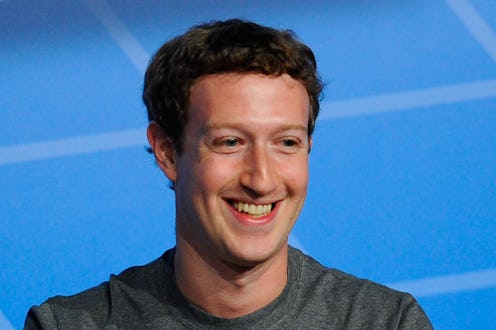News
3 Reasons Zuck Bought A Virtual Reality Company
Tuesday's news that Facebook had acquired Oculus VR sent ripples through the tech community, the gaming community, and the community of people generally skeptical of Mark Zuckerberg. Some of Oculus' initial Kickstarter backers, were incensed — the company's vision, the Oculus Rift VR headset, hasn't even been released yet. And the whopping $2 billion sale will yield no profit for the 9000-plus backers who pumped over $2 million into Oculus in the first place. But there's another big question: What does Mark Zuckerberg want with a VR startup?
Yes, Zuckerberg's Facebook has always been a proactive player in the acquisitions market, but its buys have usually made more straightforward business sense. The benefit of owning WhatsApp, for example, is obvious for a networking and communication giant — but it looks like Zuck has a grander vision. This is exemplified by Facebook's reported talks with Titan Aerospace, aiming to raise a fleet of near-orbit aerial drones to provide internet access to the developing world.
So, what exactly does our old pal Zuck have in mind? In Facebook's official statement, Zuck noted that he saw VR as a "communication platform" — but how? Three possibilities...
1. Cutting-Edge Mystique Matters, And Facebook's Core is no Longer Cutting Edge
Facebook has been around a long time, launching exclusively for American college students in 2004 and opening up to the world in 2005. But in those nine or ten years, a lot about the familiarity and utility of social media has changed, and Facebook has begun to seem a bit... mundane.
Obviously, lesser competitors like MySpace have faded into relative obscurity. But there are more ways than ever for people to communicate online, with Facebook or without, and adding new features and tools to a static profile page these days feels a lot less "brave new world" than it did a decade ago.
Basically, the acquisition of Oculus shakes up this perception of stagnation, especially as Zuckerberg himself has made it clear he sees applications for the headset beyond simple gaming.
After games, we're going to make Oculus a platform for many other experiences. Imagine enjoying a courtside seat at a game, studying in a classroom of students and teachers all over the world or consulting with a doctor face-to-face -- just by putting on goggles in your home.
2. VR is Exciting, Innovative, And A Two-Horse Race
The news of Facebook's acquisition couldn't have been more expertly timed to grab industry eyes and ears. Facebook's essentially positioned themselves in direct competition with Sony, which unveiled their planned VR headset, Project Morpheus, at the San Francisco Game Developer's Conference last week.
Which of the companies will do a better job pioneering this nascent technology is yet to be seen, though their history suggests a distinction in how they approach VR — video games are more Sony's bag than Facebook's, obviously, so you'd have to expect a leg-up in that department.
Which is why Zuckerberg emphasized different, immersive and realistic applications for the Oculus Rift. With just one truly high-profile competitor in the field, there's a chance for both products to be successful, provided they don't try to offer precisely the same things.
Obviously, Zuckerberg is an ambitious corporate kingpin, and there can be little doubt he'd love to take a major competitor down a peg. But it's also important to get your own market foothold solid, and there may not be a better time to do that with VR than now.
3. Virtual Reality Sounds Awesome, So How Many Reasons Does He Need?
Basically, this exactly the kind of image that a youth-catering company with a fresh-faced CEO should be projecting. With an emphasis on "fresh-face:" Even though we've known him for a long time, Mark Zuckerberg is still just 29 years old (he turns 30 this May).
Yes, that a lot of people are upset about the acquisition — some in the base of early Oculus backers, for example — and that makes sense. Oculus' sale to a social media and communications company has undoubtedly shifted the project's desired outcomes in drastic ways.
But this could end up playing out in everyone's best interests. Sony is a big-time rival for Oculus, and getting Facebook-level money behind the fight may have been the best chance for Oculus to keep pace.
